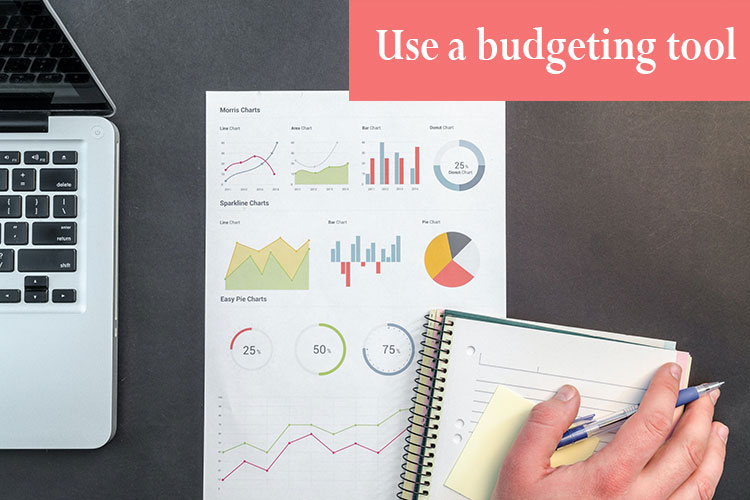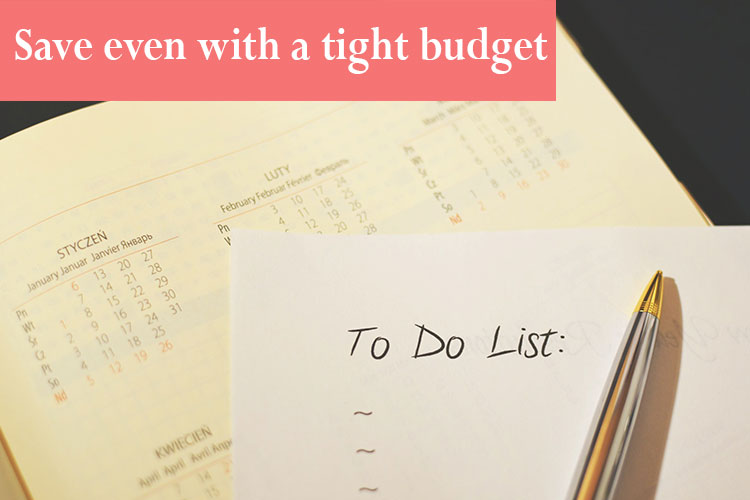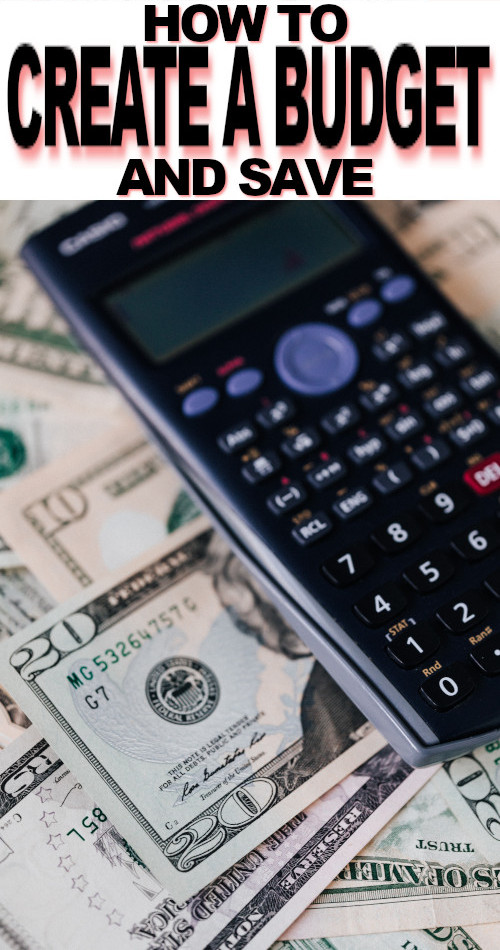Are you having a hard time saving money? especially during these uncertain times? These seven simple steps will quickly help you to create a budget, which will lead to your savings account growing, even when you thought it wasn’t possible.

For most Americans, staying in debt has become more than just a financial condition. As the United States has become universally acknowledged as a nation of spenders, incurring credit card debts has become their way of life.
Many people have been in debt for so long that they fail to live a peaceful financial life. However, following basic financial sanity can help many people avoid financial worries.
What is the basic thing that you can follow? The answer is budgeting.
Yes, monthly personal budgeting can help you mitigate (lessen) all your obligations while saving a certain amount each month. The money you save, out of all the expenses, can help you in many ways. You can achieve many important financial goals in the future like saving for education, medical treatment, and retirement.
Unfortunately, creating a solid budget is something most of us love to hate. But, creating a budget is not as daunting as you think.
So, let’s discuss how to create a budget first.
HOW TO MAKE A BUDGET
Here are some tips you can follow to create your own budget:

HOW TO MAKE A BUDGET
To create a budget, you will have to:
● Record sources of income – To prepare a budget, you will have to record the sources of your income – monthly salary, any other part-time jobs, income from investments, web marketing, selling items online, etc. In the case of a business, you will have to include all of the sources of income.
● Make a budget by listing all of your expenses – Then you will have to list all of the monthly expenses – fixed and variable. Fixed expenses are those that remain the same each month while variable expenses are the additional ones that can change each month.
● Gather all of your financial statements – Financial statements include bank account statements, investment account statements, utility bills, statements on the source of income, and expenditures.
● Calculate total income and expenses – After this, sum up the total income and expenditure separately. After you do this, you get a more or less clear idea of your total income that is your affordability and your expenses.
● Adjust expenses as per your income – When you get a rough idea of your affordability, it helps you to adjust your expenses accordingly. If you adjust the expenses according to your affordability, it may help you to stop incurring huge debts. Thus you will be able to maintain a debt-free life.

HOW TO MAKE A BUDGET TO TRACK YOUR EXPENSES
To make your budgeting efforts successful, you’ll need to keep close track of your expenditures, in fact, on every cent that you spend throughout the month. It is very important to see where your money is going and how much you’re making every month. There are some irregular expenses that are tough to track but make sure you don’t forget to keep a list of them.
Set short-term and long-term financial goals
Make sure you formulate a budget that can be followed by you. As you start making a budget, make sure you create a realistic budget. The purpose of making a budget is to save every dollar to pay off your financial obligations as soon as possible. To do so, you need to set your goals wisely. You can categorize your goals as short-term and long-term. This will help you to create a budget focusing on your goals.
Cut down on your expenses
If you want to make your budgeting efforts successful, make sure you start saving money seriously. If you’re a shopping freak, change your shopping habits so that you can utilize the saved money to pay off your financial obligations.

HOW TO MAKE A BUDGET USING A BUDGETING TOOL
This is perhaps the most important step that you need to take while preparing your monthly budget. Once you’ve decided your income and expenditure, categorize your budget according to the income from savings and investments, expenditure on discretionary items, and non-discretionary items.
Take advantage of a budgeting tool to categorize your monthly budget
If you’re not confident about your budgeting skills, make sure you use a financial tool that will help you create your budget online as you feed into your income and expenditures. Non-discretionary expenses are those expenses that you cannot do without. You cannot change these expenses with time, but the discretionary expenses can be manipulated according to your wish. Eating out, and entertainment bills fall into this category and these are some things that can be easily avoided. Try to decrease your discretionary expenses as much as possible.
Decide where to stash your savings<
Once you start following a budget, you will start saving money. Thus, you need to keep the money in a savings account for growth. Creating a piggy bank has always been a good way of saving money from time immemorial.
Keep a savings account in a reputed bank so that you can save a part of your monthly income and use it for other emergency purposes. But instead of saving money in your home, it is better to get yourself acquainted with a bank so that you may be able to create a savings account and save money there.
Make sure you don’t withdraw money from this account, let the money grow with time. If there is a real financial emergency, you may try withdrawing money from this savings account and using the proceeds.
Review the budget
It is also important for you to review your budget from time to time according to the changes in your financial condition. Your income may increase or decrease with time. Your expenditures can even go out of control. Thus, it is important to review and modify your budget according to the changes in your income and expenditures.

HOW TO SAVE MONEY EVEN WHEN YOU DON’T HAVE ROOM IN YOUR BUDGET
Most of you think that following a budget is devastating work with penny-pinching and crunching numbers in mind. However, a budget is the base of all financial foundations and without it, you’re most likely to drown in financial worries.
Just like it’s easier to avoid all the unhealthy foods than to burn them off with vigorous exercise, similarly, it’s even easier to follow a budget. In a nutshell, the best way to make money often is to save money.
Anyone who is poor or rich can benefit from saving money as this is the best way to stay on top of your finances. With the present economic situation, most people are going through a tough financial phase and they’re wondering about how they can get back a firm grip on their personal finances.
If too many high-interest debts are eroding your confidence and you’re already on a tight budget, you need not fret as there are smart ways in which you can save money despite living on a tight budget. Check out some such ways.
1. Stop using your credit card: If you want to save, you need to make sure you stop using your credit cards. The more you use your cards, the more you will run out of money. Lock them in your cupboard and go shopping with cash.
RELATED: 6 Tips for Improving your Credit Score
2. Make a ‘want’ waiting list before you go shopping: Are you aware of the marked difference between ‘wants’ and ‘needs’? If you answered no, then you should certainly educate yourself on it so that you can devote your hard-earned dollars towards the things that you need more than those you want.
Your needs are the necessities that you can’t do without and that you need every month. Money is precious and therefore it should only be spent on those things that are really necessary. If you want to buy something that you just want, wait and think twice.
While going through a credit crunch, make sure you have a close track of where your pennies are going. Keep your ‘wants’ waiting in a waiting list and look into them later on when you have enough money.
3. Consider setting aside at least 10% of your income: According to all financial experts, a person should save at least 10% of what he makes in a month, irrespective of the amount. You should follow this thumb rule regarding saving as this will help you build an emergency fund so that you can at least fall back on it when you’re facing a financial emergency.
4. Shop thrifty by using coupons: When you’re going through a credit crunch and a tight budget, you have to look for ways in which you can shop thrifty while getting the goods that you need. The grocery shops provide discount coupons for those who are keen on saving money while shopping. You should assemble such coupons and use them while shopping for your groceries so that you can save your dollars and accumulate them.
RELATED: 20 Ways to Save That You Never Thought Of
5. Get a salary hike: It is pretty difficult for someone to make ends meet until he goes through a salary hike. So, work hard to get a salary hike as early as possible.
CONCLUSION
Lastly, budgeting is the basis of leading a peaceful debt-free life. When you formulate a budget, you can see the exact income and expenditure. When you can see the total income and the total expenditure, you realize what your affordability is and how much you should expend.
You may be able to cut down on your expenses as per your affordability. So, create a budget based on your income and expenditures, and also remember to modify it according to the changes in both fields.
 Does your family have a budget? We’d love it if you would share one of your tips & tag it on Instagram with @FlusterBuster #bugetplanning #howtosave
Does your family have a budget? We’d love it if you would share one of your tips & tag it on Instagram with @FlusterBuster #bugetplanning #howtosave

MORE INSPIRATION
 7 Tips That Will Lower Your Homes Heating Costs
7 Tips That Will Lower Your Homes Heating Costs
Are you paying more than you’d like heating your home? There are some simple things that you can do right now that will drastically lower your next bill.
 5 Simple Tricks to Help You Save More Money
5 Simple Tricks to Help You Save More Money
No matter how much money we make, there are always those times when we wish that we had just a little bit extra in our pockets for some of the things that we would really like to do.
 5 Things Frugal People Spend Money On In January
5 Things Frugal People Spend Money On In January
Timing is Everything! Knowing what to buy and when to buy can save you a whole lotta’ moola. This month’s 5 frugal favorites will be saving you hundreds of dollars on things that you use everyday, so be sure to stock up.
 Simple Things You Can Do to Lower Your Electric Bill
Simple Things You Can Do to Lower Your Electric Bill
Electric bills can get scary! Luckily, there are a few simple things that you can start doing today that will take the fear out of opening your next bill.
Disclosure: Some of the links in this post are affiliate links. If you click on the link and purchase the item, I will receive a commission. I only recommend products or services that I personally believe will add value to my readers. All opinions stated are strictly my own. Read our full disclosure policy for more information.





I would say that this is a whole science – to skillfully plan and manage your money. I like people who are passionate about budget planning!
Thank you for the nice words Jasur 🙂
To properly organize and manage your money is, in my opinion, a whole science. I admire folks that are enthusiastic about budgeting!
kievwomen